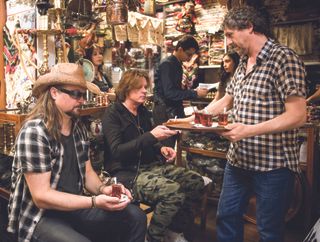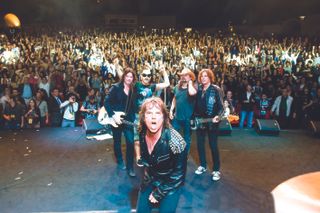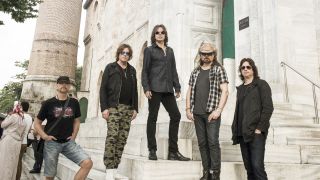Pulling into a roadside store just beyond Istanbul around midnight, Europe get a sharp reminder of Turkey’s ‘no alcohol sold after 10pm’ law. For a band who partied their way through the 80s, the Middle East circa 2015 is a rather different prospect.
The cultural hit since we landed a couple of hours ago has been varied. The neon lights and Coca-Cola billboards we drove past said one thing. The ornate minarets and booze-free night say another.
“No beer, Allah does not approve,” declares drummer Ian Haugland, returning to the bus with popcorn. His bandmates look surprised, but shrug it off cheerily enough – regaling us with touring war stories instead.
The Swedish band is accustomed to foreign surprises. Previous tours have brought them from the EU to America and South-East Asia. Now, as restrictions break down and audiences emerge, Europe are taking their show to Eastern Europe and beyond. Turkey, their current stop, is where passionate, largely uncatered-for rock fans await.
Our destination is almost 100 miles from Istanbul, in Bursa – a visibly Westernised city, albeit still rooted in orthodox culture. Tomorrow Europe will play a show there as part of the 54th International Bursa Festival. They’re the only rock act on the bill.
“It’s different now because we can tour in Eastern Europe,” says frontman Joey Tempest. “We didn’t tour in Turkey in the 80s or 90s. Some markets have opened up to rock bands in a way they hadn’t done before.”
Indeed, Turkey might have missed out on Europe the first time around, but now they’re hungry for the second wave.
Europe shot to mega-stardom with 1986’s The Final Countdown. The 80s erupted in a maelstrom of clubs and booze (“We’d party 80 per cent and play 20 per cent of the time,” says Haugland), petering out by the 90s. In 1992 they went on hiatus, returned seven years later, and have since levelled out with a consistent stream of (largely heavier, more organic) rock albums. Three of them – Tempest, bassist John Levén and guitarist John Norum – now have children, and all are embracing opportunities to play less-explored lands. Places where, until relatively recently, live rock was an unknown quantity. Over the coming days, as keyboardist Mic Michaeli tells us, they’ll also play Romania, Slovakia and Hungary. “We’ve played in Albania, too,” he says, “and Bulgaria, Indonesia… They like their rock in these places.”
Today, in Bursa, Turkey, the Islamic call to prayer rings at 4.30am – the melodious, authoritative chant resonating around the otherwise silent five-star hotel grounds. Across town, as the day gets going, young Turks check their iPhones while older Muslims don wooden sandals outside mosques. Europe’s presence makes quite a contrast.
“It’s a positive thing for Bursa,” says Efecan Bozkurt, of Istanbul-based agency Charmenko – promoter of Europe’s Bursa show. “I’ve never heard or seen something like this, a rock band playing a municipality’s festival. It’s usually commercial Turkish acts.”
Accordingly, the festival organisers seem keen to offer authentic Turkish hospitality. Lunch is served outside at a traditional Iskender restaurant, with a smiling, anxious-to-please welcome. Gazing around with interest through stylish shades, the darkly clad Swedes contrast against the tanned complexions and summery T-shirts around us. We’re served the local ‘Iskender’ lamb, followed by rocket fuel Turkish coffee in tiny, painted cups. The fruit juice in place of booze (introduced with some trepidation by our Turkish hosts) sits well with the band’s less raucous drinking patterns.
“It’s mostly beer and wine these days when we do drink,” nods Levén, in a smooth, very deep Swedish accent. “We’ve grown up a bit!” The quietly trendy, amiable bassist has the easiness of someone with grown-up children – compared with the nice-but-knackered Tempest and Norum, whose kids are much smaller.

Later Levén and Michaeli explore Bursa’s two prize creations; silk and shadow puppetry (or ‘Karagöz’, popularised during the Ottoman period). Swathes of embroidered material stand out against their denim and leather, as they stroll through markets in the attractive, older end of town. The Karagöz show there (clearly planned for our rockstar guests, carefully interspersed with Europe references) is like an Eastern Punch And Judy; the puppets beating each other profusely, amid rapid Turkish chatter.
At almost every juncture, the band are greeted by suited town officials. It’s not remotely threatening, and according to Tempest it’s the norm in countries with less of a rock tradition. In a town like Bursa – lacking the myriad gigs of, say, London – a rock show is a striking event, not a regular fixture. This sense of occasion draws local MPs, town officials, even royalty (as Europe have found in previous places).
After a press conference in town, a senior official – a grey-haired man in glasses and a silvery suit – sits smilingly with the band as they answer questions. A wall of cameras clicks furiously in front of the band (all, bar Haugland, keep their shades on), quizzed by a gaggle of journalists. Tempest, Europe’s perennial leader, documents proceedings on his iPhone. He’s sweetly friendly and well-spoken, not to mention permanently ‘on’. He says “it’s amazing” a lot. In another life he could have been a hardworking Scout leader. He co-manages all Europe’s social media, on top of keeping up with his son back home. “I really don’t have any time off,” he concedes later, frankly, but not moaning. “There’s so much to do, but it’s rewarding to be closer to fans.”
Though this is only their second Turkish trip (the first was to Istanbul in 2013), Europe have ventured to off-the-beaten-track destinations for years now.
“We did a show in Jakarta in the 80s, and the promoter hired a real rain dancer from deepest darkest Indonesia, outside the city,” remembers Michaeli. “This guy came out with feathers and a spear, and started doing this rain dance. The comment was ‘sometimes it works, sometimes it doesn’t.’ It did work that time, actually.”
“There were territories where they had guns between us and the audience,” Tempest adds. “We refused to play – I think that was Indonesia – and they changed to batons, so we played. Maybe we have that adaptability in our Viking ancestry.”
“India was interesting,” Haugland chips in. “We did Bombay in ’88, with Nazareth supporting, and they built the stage out of bamboo! I was looking at it wondering how the hell it was going to hold up, but it did. And there was a gig in Taiwan, I think, where everything was run on diesel, and we ran out of fuel after one song so the whole stage went into darkness. We had to send some guy to the nearest gas station to refill the generator!”
“But we don’t kick off in those situations,” Tempest adds. “Some of these foreign stages are crazy, some are calm…but I kinda like them. It’s that whole nomadic existence.”
Inevitably, wary attitudes have cropped up in certain less rock-friendly countries. “This woman came up to me in Romania and said she was a fan from the eighties,” Haugland says. “She told me that back then they weren’t allowed to listen to Western pop or rock music in Romania. She and her friend knew someone who smuggled in a cassette tape of The Final Countdown, and they used to gather at her grandmother’s basement, bring a blanket, a cassette player and a flashlight, and look at Western pop magazines and listen to our music. And this was only in the eighties.”
“It’s funny, because Final Countdown was part of that ‘movement’, if you like,” Tempest says. “Laibach [80s Yugoslavian band] did a version of it way back. For some people it signified some sort of liberation. It’s funny how it worked out with that song, people use it for weddings, election campaigns and sports events, and the lyrics are about a spent world!” Funny indeed.
Turkey occupies an interesting space between the East and West – both geographically and socially. Torn between multiculturalism, liberal Islam and stuffy conservatism (the kind that, only two years ago, tried to ban flight hostesses from wearing bright lipstick), it hasn’t been the easiest place for rock to thrive in. With big international acts comes the prospect of boozy hedonism, which doesn’t sit well with the orthodox end of Turkish culture.
“Politics affects the music business,” explains Bozkurt, “because music comes under ‘entertainment business’, which comes with alcohol, and the alcohol regulation has been getting tighter [e.g. strict prohibition of alcohol advertising]. Because of that, it cuts the budget of the sponsors. And at the same time the political environment has made everything a bit tighter, more conservative… until yesterday!” he finishes brightly, referring to their recent election – which saw conservative president Erdogan win a smaller majority, leaving potential for minority parties to break through.
Most visiting rock artists tend to go to Istanbul, leaving places such as Bursa especially dominated by a hybrid of traditional Turkish music and local commercial pop. While native rock bands exist, they differ from Western conceptions of the genre.
“Rock is quite marginalised here, because it is synthesised with ethnic music, world music and Arabesque music,” says Murat Beşer, journalist at Cumhuriyet, a Turkish daily. “I don’t know if you can call this ‘rock music’. In the Turkish music market, ‘ethnic rock’ is marketed as rock, but it’s not really rock.” He shows us the latest issue of Turkey’s Headbang magazine, filled almost entirely with non-Turkish bands (Metallica, Judas Priest, Europe).
“Technology made it easier for people to make albums, so lots of bands and singers are out there. But honestly, most of them can’t even play live,” adds Cenk Eroglu, Turkish producer and guitarist for Kip Winger and King Crimson’s Pat Mastelotto. “The real rock scene here will always be healthy but stay underground.”
Charmenko’s Ayşe Savci agrees that Bursa is split between conservatism and a younger, cosmopolitan mood. Traditional music forms an intrinsic part of local culture, to the point where old and current mind-sets start to overlap. “For example, Bursa’s famous for its classical musicians and most of them are gay,” she says. “And they’re very welcome, in this conservative society, because of what they do artistically. These concerts sell out.”
Rock, by contrast, has always felt more alien. In the 80s, rock’n’roll was a risky product in Turkey, as Eroglu remembers. “I had a band called Metallic Shock, I think we were the first band who used the term ‘Heavy Metal Concert’ on a banner in Turkey,” he says. “After the show, police arrested me for ‘conducting a riot’, i.e. for hosting the concert. I stayed in custody for forty-eight hours. My mom and grandmom were so scared they destroyed all my AC/DC, Kiss and Def Leppard posters.”
Today, Turkish rock fans aren’t in short supply, even if bona fide rock bands are less commonplace. Outside the hotel we meet Oğuzhan Hasdoğru, founder of europethebandmuseum.com – the ‘first and only memorabilia museum of Europe.’ His friends (like him, wearing Europe War Of Kings T-shirts) hover around our party and film us.
“I am their biggest fan since 1986,” he says proudly. “I have spent all my life and all my salary on my Europe collection. And there are many more rock fans in Turkey, especially classic rock. Lots of us here love Zeppelin, and eighties groups.”
Later, heading for their ride to tonight’s venue, Europe gamely pose for photos with Hasdoğru and his posse. Tour manager Stefan politely (but firmly) moves proceedings along, and we’re off.

Gig time approaches at Açık Hava Tiyatrosu: open-air theatre, and the main venue for the 54th International Bursa Festival (a one-gig-per-night affair, spread over three months). Four thousand or so plastic seats slope up old concrete semi-circles, like classroom chairs in a gladiator arena. An eerily empty gladiator arena, as final preparations are made.
The crew make last-minute stage checks as videos advertising other festival acts are projected. Besides Europe, they’re all Turkish classical or pop artists. Backstage, a woman in a hijab bustles around pouring hot drinks. The band warm up in their dressing room (the walls bedecked with posters of past, mostly classical, performers), while outside the punters arrive in droves.
Everyone is scanned and searched as they quietly file through, in a rainbow of classic rock band T-shirts – AC/DC, Guns N’ Roses, Europe, Slayer – many with astonishingly young owners. A decent quota of 40-plus fans are also present, but it’s predominantly under-30s. One group of 20-somethings earnestly chorus “Yes!” when asked if they’re big rock fans, and tell us their favourite bands are Bon Jovi and Cinderella.
Two curly-haired 16-year-olds in Metallica T-shirts sit near the front. “We’re fans of Europe, Guns N’ Roses, Iron Maiden,” says one. “But rock’s underground in Turkey, it’s not mainstream.”
“It’s my first rock concert here,” adds his friend.
The bar sells only popcorn, candy floss and soft drinks. There’s not a drop of alcohol in sight. It smells like a funfair, far removed from the beery stickiness of British gigs. Once the lights go down, however, the music dominates – led by Tempest on jubilant form, brandishing his white mic stand like Excalibur. Though a little reserved at first, the crowd is soon singing along to Europe’s latest LP War Of Kings, as well as classics such as Carrie. The mood grows euphoric, and it becomes clear what a rare treat this is for those gathered. The Metallica T-shirt teens beam with utterly unjaded enthusiasm. Confetti cannons erupt for The Final Countdown, and the cheers shoot up a key or two.
Later, as a few fans wait outside, the band are escorted to their van by a security entourage the size of a small army.
“That was great!” Tempest beams breathily. “They’re not spoiled in countries like this, they’re spontaneous and so appreciative.”
“Music is for everyone. It doesn’t matter what your religion or political inclination is,” adds Haugland. “It’s a great reminder of our ability to have community, shared feelings, good things.”
Among the festival officials we speak to, the hope is that the popularity of tonight’s gig will inspire similar shows – in other towns, as well as Bursa. Sales for recent Megadeth gigs were strong, and Europe’s night was a near-sellout.
“In my opinion, rock music is representing the inner self for a lot of Turkish people,” Bozkurt said to us, thoughtfully. “It’s a private thing for them. So people can be grey outside, but they’re very colourful inside. Whatever you do, you cannot really stop people wanting what they want.”
To Tempest, these eastward places are increasingly viable prospects. Not to mention appealing to a simple, boyish taste for adventure – part of the ongoing fun of being able to play shows after 30 years.
“The promoters are becoming more serious. They are looking around the world inviting bands. We always go back if we have fans there, if it’s a good offer and if we enjoy the experience. We tend to enjoy every place, even if it goes pear-shaped!” He pauses, his eyes lighting up. “It’s kind of an exciting life, y’know?”


